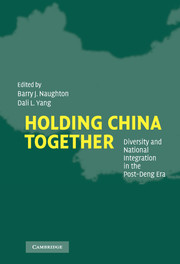Book contents
- Frontmatter
- Contents
- List of Figures and Tables
- List of Contributors
- Acknowledgments
- Holding China Together: Introduction
- PART ONE THE INSTITUTIONS FOR POLITICAL AND ECONOMIC CONTROL: ADAPTATION OF A HIERARCHICAL SYSTEM
- 1 Political Localism Versus Institutional Restraints: Elite Recruitment in the Jiang Era
- 2 The Institutionalization of Elite Management in China
- 3 The Cadre Evaluation System at the Grass Roots: The Paradox of Party Rule
- 4 Economic Transformation and State Rebuilding in China
- PART TWO CASE STUDIES OF POLICY IMPLEMENTATION
- Index
2 - The Institutionalization of Elite Management in China
Published online by Cambridge University Press: 08 December 2009
- Frontmatter
- Contents
- List of Figures and Tables
- List of Contributors
- Acknowledgments
- Holding China Together: Introduction
- PART ONE THE INSTITUTIONS FOR POLITICAL AND ECONOMIC CONTROL: ADAPTATION OF A HIERARCHICAL SYSTEM
- 1 Political Localism Versus Institutional Restraints: Elite Recruitment in the Jiang Era
- 2 The Institutionalization of Elite Management in China
- 3 The Cadre Evaluation System at the Grass Roots: The Paradox of Party Rule
- 4 Economic Transformation and State Rebuilding in China
- PART TWO CASE STUDIES OF POLICY IMPLEMENTATION
- Index
Summary
Since the late 1980s, the Chinese Communist Party (CCP) has weathered a series of crises but continues to dominate the Chinese political scene. Although the CCP has laid out rules and procedures over the past decade to govern its own activities and to clarify its relationship with other political institutions, this process of institutionalization remains partial and very much incomplete. Moreover, the party's willingness to submit itself to binding rules may ultimately conflict with its mission to guide and transform all of society. However, the CCP's ability to initiate a process of institutionalization has been a key source of its political resilience since the early 1990s. The strength of the CCP, in turn, has been an important factor contributing to national stability and unity.
Because Chinese politics has long been regarded as essentially informal, much attention has been devoted to how extra institutional factors, such as a certain political figure or a network of politicians, exert decisive influence on Chinese politics. An analysis of formal institutions, with a few exceptions, has largely been neglected. Consequently, even though China's economic achievements in the past two and a half decades have been widely acknowledged, the development of political institutions during the same period has not been fully analyzed. Yet these political institutions are an integral part of Chinese politics, and the substantial changes undergone by Chinese political institutions are a reflection of the broader political shifts within China itself. In the history of the People's Republic of China, leaders have used institutions to achieve very different political objectives.
- Type
- Chapter
- Information
- Holding China TogetherDiversity and National Integration in the Post-Deng Era, pp. 70 - 100Publisher: Cambridge University PressPrint publication year: 2004
- 25
- Cited by



